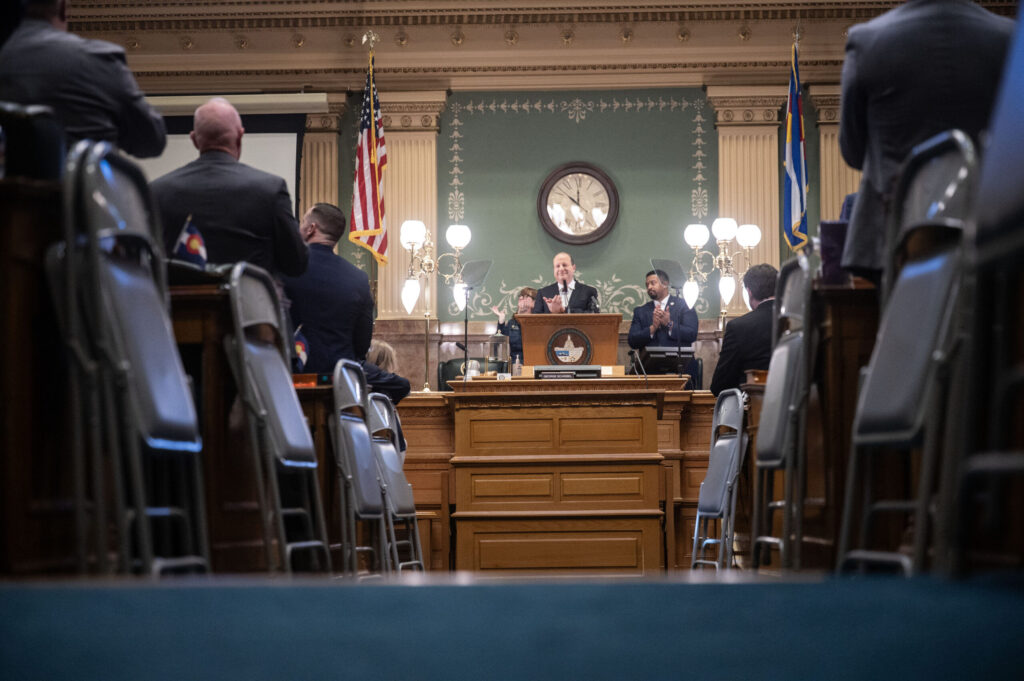This Colorado bill would ban teacher strikes and hit violators with fines and jail time

Two Republican lawmakers who have long helped shape education policy in Colorado have introduced a bill that would bar teachers from striking and strip unions that endorse strikes of their bargaining power.
This bill stands practically no chance of becoming law. House Democrats already killed a bill this legislative session that would have prohibited any union activity by public employees during work hours, and this measure goes much further in limiting the rights of workers.
However, that it was introduced at all speaks to growing concern that the wave of teacher activism that has hit other states could come to Colorado. Last Monday, several hundred teachers marched at the state Capitol for more school funding and to defend their retirement benefits. Hundreds, perhaps thousands more, are expected for more marches this Thursday and Friday.
Earlier this year, the Denver Classroom Teachers Association threatened to strike before backing off and continuing negotiations over that district’s pay-for-performance system. And Pueblo teachers voted to strike this month after the school board there voted down pay raises.
According to numerous reports, Colorado consistently ranks in the bottom tier of U.S. states for both education funding and teacher salaries, though there is considerable variation around the state.
The reaction at the Capitol to teacher activism has fallen largely on party lines, with House Democrats joining teachers in calling for more school funding, and Republicans expressing frustration because this year’s budget already includes an increase for K-12 education. Republicans want to secure more funding for transportation projects, and lawmakers are also arguing over the final form of a proposed overhaul to the public employees retirement system.
The bill sponsored by state Sen. Bob Gardner of Colorado Springs and state Rep. Paul Lundeen of Monument would prohibit teachers and teachers unions from “directly or indirectly inducing, instigating, encouraging, authorizing, ratifying, or participating” in a strike. It also would prohibit public school employers from “consenting to or condoning” a teacher strike.
The bill authorizes public school employers to go to court and get an injunction against a teacher strike.
Teachers who violate such an injunction could be fined up to $500 a day and be jailed for up to six months. They would also face immediate termination with no right to a hearing.
Local teachers unions found in contempt could face fines of up to $10,000 a day. More significantly, they would see their collective bargaining agreements rendered null and void and would be barred from representing teachers for a year or collecting dues during that time. School districts would be barred from negotiating with sanctioned unions as well.
Courts would have the ability to reduce these penalties if employers request it or if they feel it is in the public interest to do so.
Teacher strikes are rare in Colorado and already face certain restrictions. For example, the Pueblo union has informed state regulators of their intent to strike, and the state Department of Labor and Employment can intervene to try to broker an agreement. Those discussions can go on for as long as 180 days before teachers can walk off the job.
The last time Denver teachers went on strike was 1994. A state judge refused to order teachers back to work because they had gone through the required process with state regulators. Teachers had the right, he ruled, to reject the proposed contract. That strike lasted a week before teachers returned to work with a new contract.
Chalkbeat is a nonprofit news site covering educational change in public schools.













